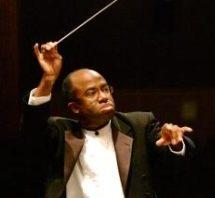
The fault lay not with conductor Michael Morgan. As he explained by phone some weeks back, at the start of our interview on race relations in art (see "Looking the Other Way: Racism in Classical Music"), the 19-season music director had hoped to mount either the same full-evening version of Show Boat that was seen in Carnegie Hall earlier this year, or his own treatment of the musical. Unfortunately, the Rodgers and Hammerstein Concert Library rejected both.
Hence Morgan had no choice but to present the well-worn, officially sanctioned concert version that employs a narrator (Eric Wenburg) to advance the story, and to fill out the evening with eight selections from the Jerome Kern songbook.
I can only imagine what Wenburg, who has played Captain Andy in San Mateo’s Broadway by the Bay presentation of this musical, felt when asked to recite dialogue that glosses over the entire emotional crux of the story. The heart-tugging issues of miscegenation, racial injustice, and friendships that transcend racial bigotry are acknowledged in mere sentences. Someone exposed to Show Boat for the first time would have had no idea how groundbreaking the libretto is, or how profound the songs “Ol’ Man River” and “Bill” can be.
No wonder Wenburg occasionally sounded artificial. He could just as well have been a politician delivering a prepared-by-others speech that does everything it can to skirt the issues. Why the R & H Concert Library sticks with this Reader’s Digest shortchange is anyone’s guess.
On With the Show
Where little came up wanting was in the singing. Mezzo-soprano Debbie de Coudreaux (Julie), who has headlined on Broadway and in Paris’ Moulin Rouge, has an irresistible, kittenish voice that can purr, pout, and pull at the heartstrings. Her “Can’t Help Lovin’ Dat Man” was as inimitable as they come, and her second verse of “Bill” the most moving performance of the evening. We are blessed to have her in the Bay Area.Soprano Julie Adams (Magnolia), a sophomore at the San Francisco Conservatory of Music, walked onstage with the blonde “do” and upper-body carriage of a Miss America. Before she had even uttered a sound, a sizable segment of the audience expressed its appreciation. Happily, Adams also has some terrific pipes. The voice, which would work well for operatic soubrette parts, has all the naive, little-girl appeal that “Make Believe” and Julie’s other tunes call for.
Soprano Tami Dahbura (Ellie), who has sung off-Broadway and in touring companies, had only one opportunity to shine, though shine she did — especially in the songbook portion of the evening (more to come on that below).
Men Come Up Short
My feelings were mixed about the men. Tenor Ben Jones (Gaylord Ravenal), who is a Beach Blanket Babylon regular, as well as conductor of the San Jose Youth Symphony, has a fine voice, but does not always attack higher notes with the support and strength they need to sound freely. Baritone (bass-baritone?) Robert Sims (Joe, written for Paul Robeson), who has performed everywhere from Jessye Norman’s recent “Honor! Celebration” in Carnegie Hall to the Crystal Cathedral’s Hour of Power, definitely has the range and power that “Ol’ Man River” requires, but also a bit of a showbiz affect that makes his singing seem somewhat plastic. This was far more the case in the first half; nonetheless, once the impression was made, it stuck. Still, the audience went wild over him.
The Oakland Symphony Chorus has fine soprano and alto sections, yet is lamentably underpowered in the male department. (It has three women singing tenor.) It can also sound somewhat square and overly deliberate.
In the orchestral department, when the strings were heard alone, they created an idiomatic silky sound that Mantovani would have been proud of. Unfortunately, at least from the lower balcony, once the horns got going (which they did frequently), other instruments took second place. Perhaps the vocal mics upfront gave them a disproportionate boost, or the Paramount’s dire acoustic did everyone else in. The fine, partially amplified quartet — Ellen Wassermann, piano; Steven Parker, sax; Patrick McCarthy, bass; and Artie Storch, drums — that accompanied some of the singers, fared best.
In the first half, de Coudreaux’s delivery of Jerome Kern’s song “Yesterdays,” Dahbura’s “Why Was I Born?” and “I Won’t Dance,” and Adams’ superb “Smoke Gets in Your Eyes” were major highlights. Sims sounded too manufactured in “Pick Yourself Up,” and Jones lathered on the sentiment in “Long Ago and Far Away.” Lamentably, perhaps due to the arrangement, de Coudreaux’s “The Way You Look Tonight” was the most unromantic rendition of it I’ve ever heard.
Morgan’s idiomatic conducting gave his singers all the freedom they desired, and his spiels about various numbers were worth their weight in gold. There are many, many reasons Oakland East Bay Symphony patrons love the man, not the least of which is his totally unpretentious, “shall we talk?” communication skills. Despite the concert version's hatchet job, this Show Boat-lite concluded the OEBS season on a high note.

